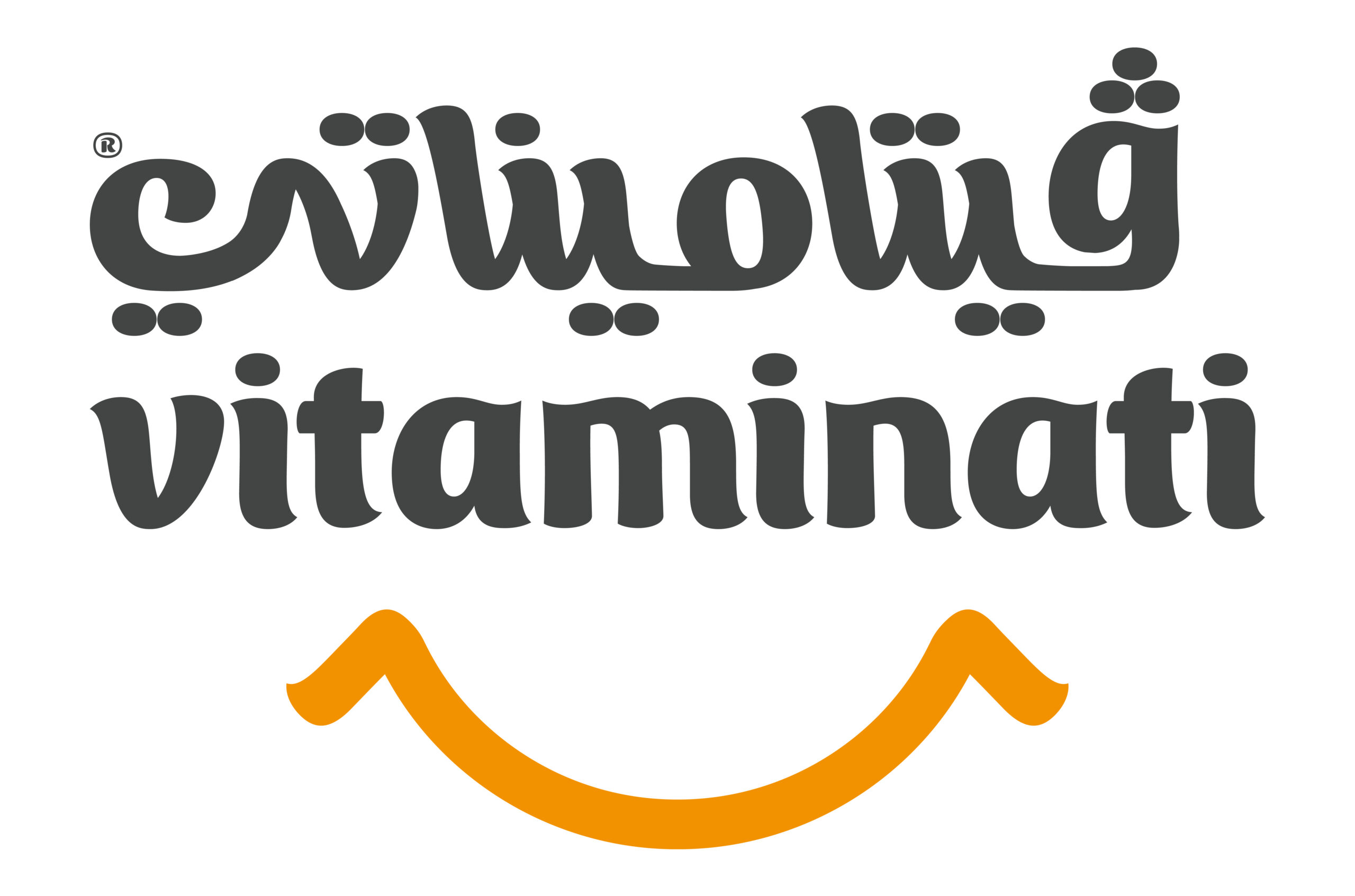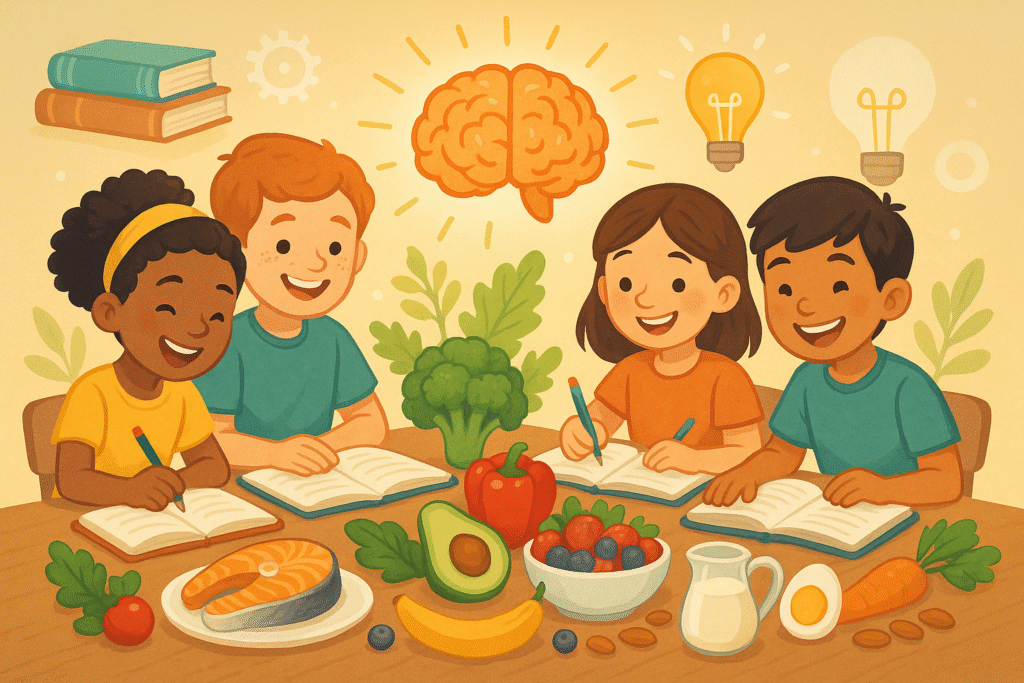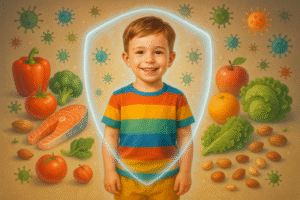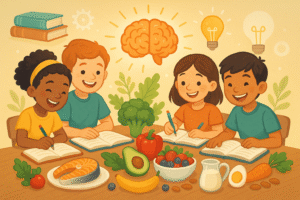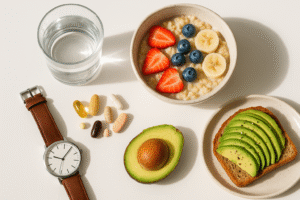Table of Contents
ToggleWhy Children Need the Best Vitamins for Focus and Memory?
From a clinical pharmacy perspective, the brain’s ability to concentrate and retain information depends heavily on proper nutrition.
During growth, children experience rapid brain development that requires a steady supply of micronutrients. When key vitamins or minerals are lacking, the result can be poor concentration, fatigue, or slower learning. so what are Best vitamins for kids’ focus and memory?
According to data from the World Health Organization (WHO), deficiencies in iron, zinc, and essential fatty acids like omega-3 remain common worldwide among children — and these nutrients play vital roles in neurotransmission, oxygen delivery, and energy metabolism in the brain.
Parents can support optimal brain function by providing a balanced diet that includes the best vitamins for kids’ focus and memory, ensuring adequate intake of these essential nutrients before considering supplementation.
The Clinical Importance of Balanced Nutrition:
Every cell in a child’s brain requires glucose, amino acids, fatty acids, and a range of vitamins and trace minerals to function.
When any of these components are missing, the brain’s biochemical pathways slow down. Neurotransmitters such as dopamine, serotonin, and acetylcholine depend on vitamins like B6, B12, folate, and minerals like iron and zinc for their synthesis.
As a pharmacist, I often remind parents that vitamins are not “energy boosters” in themselves — they act as cofactors in critical metabolic reactions.
In other words, vitamins help the brain use food efficiently, maintain alertness, and form new memories. A balanced diet, therefore, forms the first line of defense against concentration problems in children.
Can the Body Get All Vitamins from Food Only? A Complete Guide to Nutritional Balance.
The Best Vitamins for Kids’ Focus and Memory:
What are Vitamins and why are they essential for the human body?
Several vitamins and minerals have been clinically linked to improved cognitive performance and learning. Below is a pharmacist’s review of the most important ones, based on current evidence.
Vitamin B Complex: Essential for Cognitive Performance.
B vitamins — particularly B6, B9 (folate), and B12 — are essential for nerve health and neurotransmitter synthesis.
Vitamin B12 supports the production of myelin, the protective sheath around nerve fibers that allows faster signal transmission.
Low B12 levels in children can lead to fatigue, difficulty concentrating, and irritability.
Vitamin B6 and folate assist in the synthesis of serotonin and dopamine, which regulate attention and mood.
According to the National Institutes of Health (NIH), maintaining optimal levels of B vitamins can improve mental clarity and prevent cognitive sluggishness in both children and adults.
Good food sources include eggs, liver, lentils, and milk. These naturally provide some of the best vitamins for kids’ focus and memory without the need for supplementation.
Omega-3 Fatty Acids: Building Blocks for Brain Development.
Omega-3 fatty acids, especially DHA (docosahexaenoic acid), are integral components of neuronal membranes.
Children’s brains continue to accumulate DHA until around age 10, making dietary intake crucial.
Clinical studies reviewed by the European Food Safety Authority (EFSA) show that omega-3 supplementation can enhance reading ability, memory retention, and behavioral focus in school-aged children.
Fatty fish such as salmon and sardines, walnuts, and flaxseeds provide natural sources of DHA and EPA.
For children who dislike fish, pharmacists often recommend purified omega-3 supplements that meet pharmaceutical quality standards, ideally after consulting a pediatrician.
Regular intake of omega-3s is one of the most effective ways to support kids’ focus and memory naturally.
Iron: Oxygen for an Active Brain.
Iron is not technically a vitamin but a trace mineral — yet its impact on focus is profound.
The brain consumes about 20% of the body’s oxygen supply, and iron is the key element in hemoglobin that transports that oxygen.
Insufficient iron leads to reduced cerebral oxygenation, manifesting as fatigue, restlessness, and attention deficits.
According to the American Academy of Pediatrics (AAP), iron deficiency remains the most common nutritional deficiency in children.
Early correction of low iron levels improves memory and academic performance within weeks.
Iron-rich foods include red meat, spinach, and lentils. Pairing these with vitamin C (from oranges or peppers) enhances absorption.
Zinc: The Memory Enhancer.
Zinc participates in over 300 enzymatic reactions, including those responsible for brain signaling and neuroplasticity.
Low zinc levels have been associated with poor attention span and slower cognitive processing.
In clinical pharmacy practice, zinc is often discussed as a cofactor for enzymes that regulate synaptic communication — meaning it literally helps brain cells “talk” to one another.
Natural sources of zinc include nuts, beans, yogurt, and whole grains.
Together with iron and B vitamins, zinc is part of the best vitamins for kids’ focus and memory, particularly for those who struggle with concentration.
Other Important Vitamins: C, D, and A.
-
Vitamin C acts as a strong antioxidant, protecting the brain from oxidative stress caused by environmental toxins and stress.
-
Vitamin D helps maintain nerve function and hormonal balance, both of which influence mood and focus.
-
Vitamin A supports visual processing, which indirectly aids learning and attention in early childhood.
Although these vitamins may not directly stimulate memory, they maintain the overall environment that allows the brain to perform at its best.
How the Best Vitamins for Kids’ Focus and Memory Improve Learning:
From a pharmacological standpoint, these nutrients enhance several measurable aspects of brain function:
-
Improved neurotransmitter production (B vitamins, iron, zinc)
-
Better cell membrane fluidity and neuron communication (omega-3 fatty acids)
-
Enhanced oxygen and glucose metabolism (iron and vitamin C synergy)
Clinical studies show that children with balanced micronutrient levels demonstrate higher reading comprehension and fewer symptoms of hyperactivity.
As pharmacists, we encourage dietary approaches first — supplements come second when deficiencies are documented.
Natural Food Sources of the Best Vitamins for Kids’ Focus and Memory:
| Nutrient | Rich Food Sources | Clinical Role |
|---|---|---|
| Iron | Red meat, liver, lentils, spinach | Improves oxygen flow to the brain |
| Zinc | Nuts, legumes, dairy | Enhances neurotransmission |
| Vitamin B12 | Eggs, milk, fish | Supports nerve myelination |
| Omega-3 | Salmon, sardines, flaxseeds | Builds neuron structure and memory |
| Vitamin C | Citrus fruits, peppers | Boosts Iron absorption and brain protection |
Preparing meals with these ingredients ensures that children receive natural, bioavailable nutrients without the risks of excess supplementation.
Read more about the effect of cooking on vitamins content in food.
When to Consider Supplements for Focus and Memory?
Pharmacists and pediatricians generally agree that supplementation should be considered only when:
-
Blood tests confirm a deficiency (e.g., low iron or B12).
-
The child follows a restrictive or vegetarian diet.
-
There are chronic absorption issues or poor appetite.
In such cases, the healthcare provider prescribes pharmaceutical-grade supplements with precise doses.
Lifestyle Advice to Support Focus Alongside Vitamins:
A pharmacist’s role includes guiding families beyond supplementation.
To maximize the benefit of the best vitamins for kids’ focus and memory, parents should:
-
Maintain regular sleep schedules (8–10 hours).
-
Encourage daily physical activity to stimulate circulation.
-
Reduce excessive sugar and processed snacks.
-
Offer balanced meals rich in whole foods.
-
Limit screen exposure and encourage reading or creative play.
These habits, together with proper nutrition, create an environment where the child’s brain functions optimally.
Pharmacist’s Warnings on Vitamin Overuse:
Excessive vitamin intake can harm rather than help.
For example, too much vitamin A may cause liver stress, while high iron levels can damage organs.
Clinical pharmacists emphasize that vitamins are therapeutic agents, not harmless candies.
Always follow medical guidance and avoid combining multiple fortified foods and supplements without supervision.
Conclusion: Clinical Insights on the Best Vitamins for Kids’ Focus and Memory.
As a clinical pharmacist, I can confirm that the best approach to enhancing children’s focus and memory is a nutrient-rich, balanced diet supported by medical assessment when necessary.
The best vitamins for kids’ focus and memory — B vitamins, omega-3, iron, and zinc — are widely available in everyday foods.
When deficiencies occur, properly dosed supplements can restore brain function safely and effectively.
Best Vitamins for 2-Year-Old Children: What Your Child Needs at the Start of Growth.
In short, food builds the foundation, and pharmacy ensures safety and precision.
Together, they create the conditions for a healthy, focused, and intelligent child.
Frequently Asked Questions:
1. What are the best vitamins for kids’ focus and memory?
B vitamins, iron, zinc, and omega-3 fatty acids support neurotransmission, energy metabolism, and learning ability.
2. Should parents give supplements daily?
Only if prescribed by a healthcare provider after confirming deficiency.
3. Can omega-3 really improve academic performance?
Yes. Clinical trials show measurable gains in reading and memory scores after regular omega-3 intake.
4. How can parents detect low iron or B12 levels?
Common signs include fatigue, pale skin, and slow learning. A blood test confirms the diagnosis.
5. Are multivitamins safe for children?
Pharmacist-approved pediatric formulations are safe at recommended doses; adult products should be avoided.
6. What’s the safest long-term strategy?
Prioritize food variety, regular meals, and hydration. Use supplements only when medically indicated.
Final Note from a Clinical Pharmacist:
The best vitamins for kids’ focus and memory are not quick fixes. They work as part of a healthy routine built on real food, quality sleep, and emotional balance.
Smart nutrition today means sharper minds tomorrow.
PharmD with expertise in pharmaceuticals and a passion for making medical knowledge clear, accurate and accessible to all
